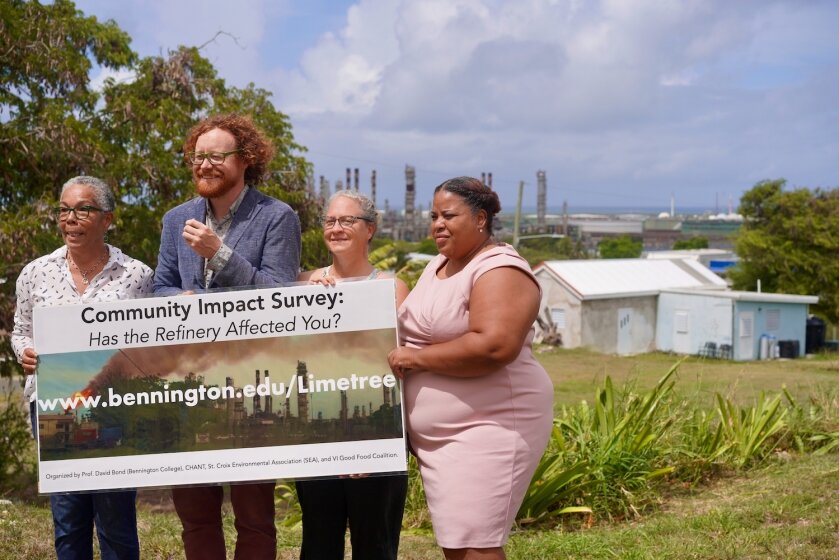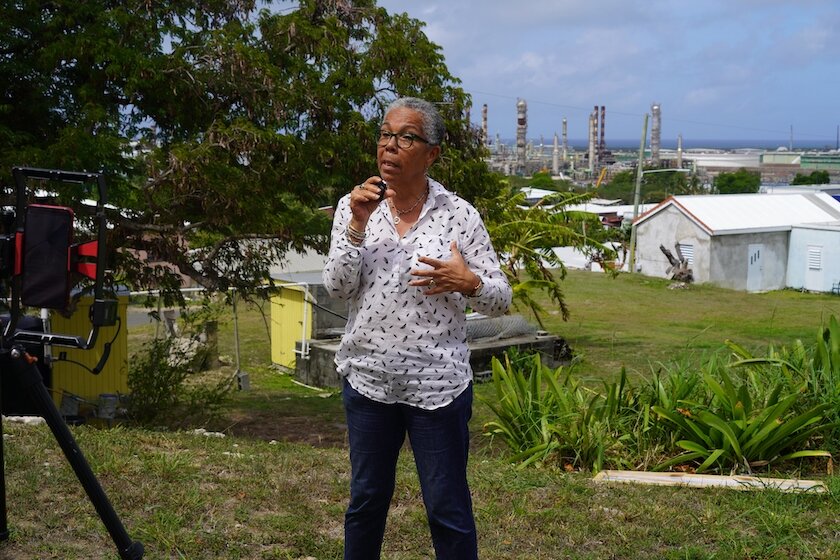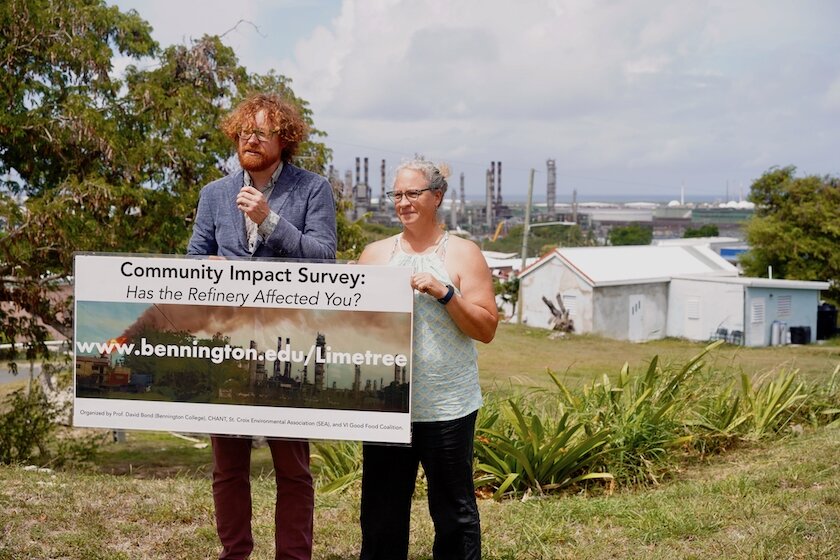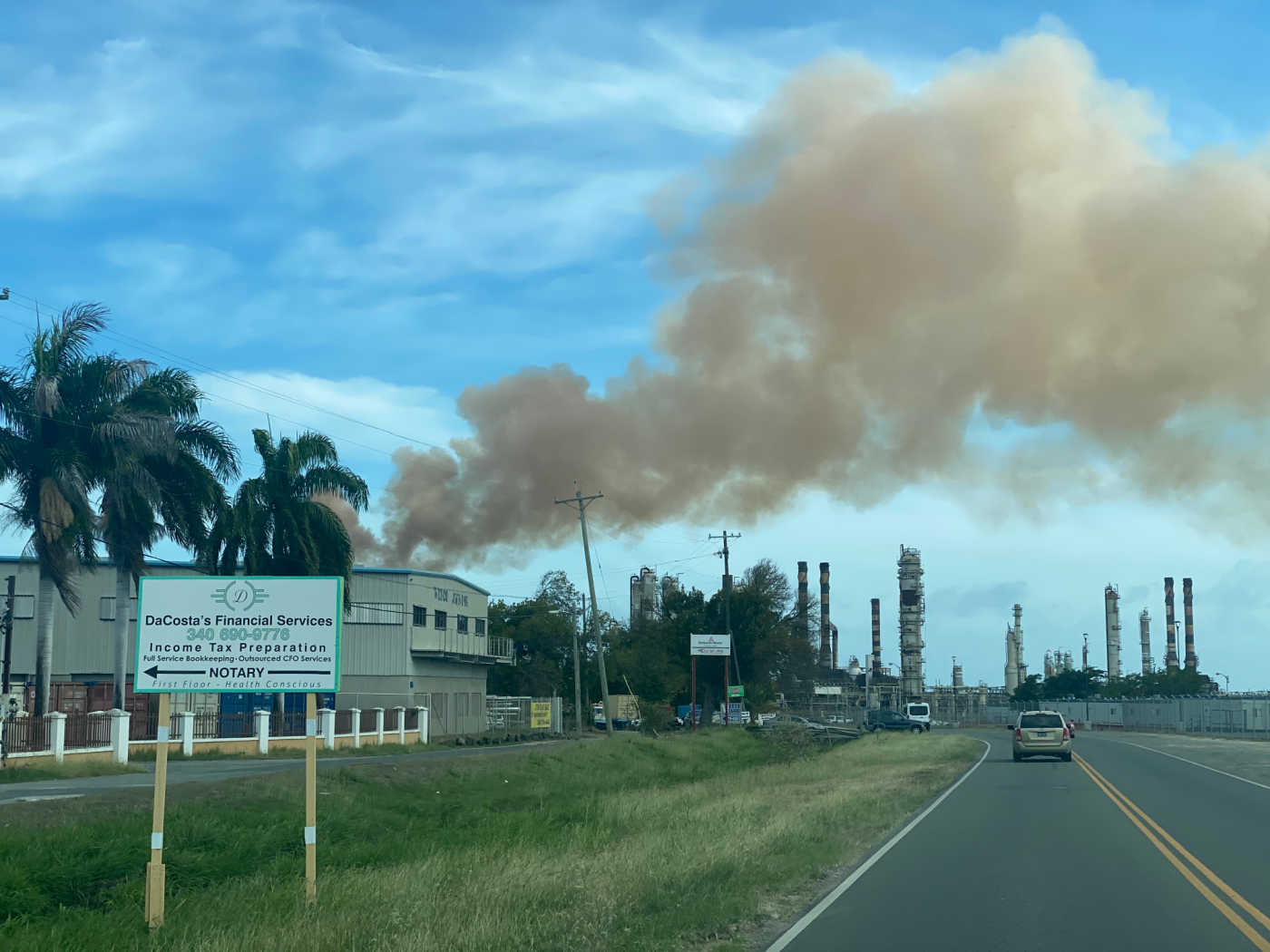KINGSHILL — A day after the Limetree Bay Refinery announced it would cease operations in September, a Community Impact Survey continues to gather evidence of widespread health impacts from operational failures at the refinery.
The Community Impact Survey is ongoing through July 9th, and all residents of St. Croix are encouraged to take the survey by going to: www.bennington.edu/Limetree. Whether or not you’ve been impacted by Limetree Bay, if you live on St. Croix, the people conducting the survey invite you to contact them.
Five days after it was launched, this Community Impact Survey continues to collect stories and measure impacts from residents that felt assaulted by the refinery emissions and forgotten by their government.
“I am concerned about what this means for the people. All people, the people who will be laid off, the people impacted by the incidents, and the people of St. Croix. We are a community of black and brown people who have been historically burdened by the effects of the refinery and left with the aging facility, undocumented health impacts and no remediation to environmental impacts caused by refining. There is no question in my mind that this is an environmental justice issue and holding industry accountable is long overdue,” said Sommer Sibilly-Brown, Executive Director Virgin Islands Good Food Coalition.

“The people of St. Croix are owed a great debt accruing from the historical operations of petrochemical plants on our island. The decision by Limetree to cease refining operation is not only an economic decision but an environmental and health decision as well. The environmental injustices suffered by our community must be addressed and repaired. The health impacts of the recent incidents at Limetree Refinery are just beginning to be identified by an independent survey, and Limetree must live up to its commitment to address the health impacts and to repair the injuries and damage to the people of St. Croix caused by these incidences,” said Frandelle Gerard, Executive Director of Crucian Heritage and Nature Tourism (CHANT).
“Limetree is lacking far more than just capital. Limetree has spent the past six months ignoring compliance with environmental law and disregarding the well-being of St Croix. Fixing the damages already done to the people of St Croix must be part of any decision to restructure Limetrees operations,” said David Bond, Professor at Bennington College.
As the governor, refinery officials, and local leaders begin negotiating the next chapter for St. Croix, it is essential that the tremendous environmental and health impacts experienced by the people of St. Croix be acknowledged and remedied.

Preliminary Findings on Impacts
In only a few days, this Community Impact Survey has collected overwhelming evidence of broad environmental and health impacts in the neighborhoods adjacent and downwind of the Limetree Refinery on St. Croix.
Talking with residents outside major grocery stores and in impacted neighborhoods over the past five days, we’ve been horrified by what we are learning. Hundreds if not thousands of families were severely impacted by Limetree’s unchecked and unmonitored emissions. Many individuals have yet to receive any assistance, despite desperate and repeated calls to the refinery, to local government, and to EPA.
Among the citizens we’ve spoken to there is a widespread sentiment: these Black and Brown communities feel under assault by Limetree’s environmental negligence and abandoned by government agencies tasked with protecting their health.
We have collected stories of children falling out of bed in the dead of night, choking and unable to breathe. We have heard from parents that smelled petrochemicals and thinking they left the stove on, stood up only to pass out and fall flat on the floor. We’ve gathered stories of people debilitated by fumes so thick they appeared as a fog, inside their homes. We’ve heard from workers unable to continue working outdoors as petrochemical fumes overwhelmed their jobsite. We’ve also heard about ER rooms so full of people sickened by emissions that the wait for medical assistance stretched into the next day.
Hundreds of people on the West End of St. Croix struggled to breathe on a near daily basis in late April and early May. Many continued to smell noxious gases weeks after EPA shut the refinery down.
During some flaring and emissions episodes at the Limetree Refinery, a picture is coming into focus of entire neighborhoods stricken with severe headaches and vomiting.
Many people we’ve spoken to in Whim, Concordia, Whites Bay, Smithfield, Wheel of Fortune, and La Grange found an oily film on their gardens, their cars, their roofs, and in their drinking water cisterns after emission episodes at Limetree. The oily residue, which smelled of petrochemicals, killed vegetable gardens, fruit trees, and other plants. For many residents, the chemicals that were emitted remain in their drinking water cisterns as no one has come to help them clean-up, despite multiple calls to the refinery and the local government. Contaminated cisterns, the primary source of potable water, are still being used by some residents on St. Croix for bathing, cooking, and drinking water.
For those with underlying respiratory issues like asthma or lung cancer, it was even worse. Some have shared stories of gasping for breath as their throats burned with asphyxiating sulphurous emissions, terrified they would not make it to the phone to call for help.
“Since this facility’s restart, fumes and flares and other incidents have jeopardized the health and well-being of the St. Croix community. If refining does resume at any point, our government leadership must ensure that this facility is in full compliance with environmental laws, robust pollution monitoring, and all available protections in place for the health and safety of the community that has long suffered the burdens of environmental injustice,” said Jennifer Valiulis, Executive Director of the St. Croix Environmental Association (SEA).

“The Limetree Refinery’s operational failures have assailed poor communities of color on St Croix for the past six months. The people of St Croix have witnessed their homes, their gardens, and their bodies drenched in petrochemical rain and asphyxiating sulfurous emissions on a near daily basis. For weeks on end. This would not happen anywhere else in the US. And yet St Croix is part of the US. The colonial truth of environmental racism and the substantive remediation owed the people of St Croix cannot be deferred in the decision to restructure Limetree,” said David Bond, Professor at Bennington College.
Responding to community concerns, this Community Impact Survey gathers local information about the emissions and petrochemical releases from the Limetree refinery in the past six months. This information is providing a preliminary measure and a map of the impact Limetree is having on the homes, gardens, water cisterns and health of residents of St. Croix.
The survey can be accessed online at: www.bennington.edu/Limetree. The survey was designed and organized by Dr. David Bond (a professor from Bennington College in Vermont), Crucian Heritage and Nature Tourism (CHANT), St. Croix Environmental Association (SEA), and VI Good Food Coalition. Local volunteers will be taking the survey door-to-door and will be outside stores in the coming days. All adult residents of St. Croix are encouraged to complete the survey. It takes about 4 minutes to complete. The deadline for completing the survey is July 9, 2021.
The Limetree/HOVENSA refinery has a long history of environmental neglect on St. Croix. Once the largest refinery in the world, the facility closed abruptly in 2012 after being fined and required to spend $700 million to address decades of routine contamination of the island’s air and sole aquifer. Sidestepping environmental law for restarting refineries, the Trump Administration permitted Limetree to come back online without first addressing damaged infrastructure and outstanding fines. After nearly a decade of being closed, Limetree resumed operation in January.
St. Croix is an environmental justice community. It is well-documented that poor communities of color often bear an outsized burden of the nation’s pollution problems, a trend identified as environmental racism. To help rectify this, the EPA and others have committed to bringing extra vigilance to vulnerable populations to ensure their environmental well-being. These sensible safeguards have not yet been fully implemented in St. Croix, and Limetree is currently disputing designating St. Croix as an environmental justice community.

